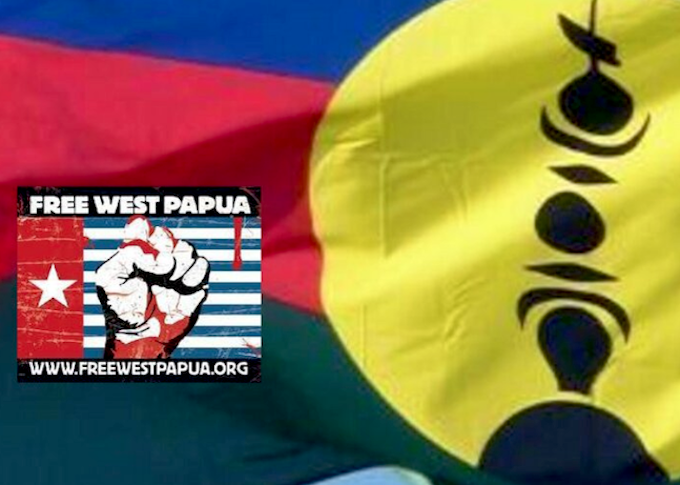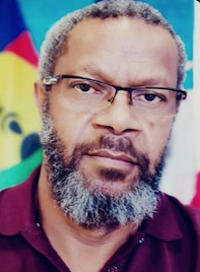
COMMENTARY: By Jimmy Naouna in Nouméa
The unrest that has gripped Kanaky New Caledonia is the direct result of French President Emmanuel Macron’s partisan and stubborn political manoeuvring to derail the process towards self-determination in my homeland.
The deadly riots that erupted two weeks ago in the capital, Nouméa, were sparked by an electoral reform bill voted through in the French National Assembly, in Paris.
Almost 40 years ago, Kanaky New Caledonia made international headlines for similar reasons. The pro-independence and Kanak people have long been calling to settle the colonial situation in Kanaky New Caledonia, once and for all.
- READ MORE: France sends armoured vehicles with machine gun capability to New Caledonia
- Other Kanaky New Caledonia reports

Kanak people make up about 40 percent of the population in New Caledonia, which remains a French territory in the Pacific.
The Kanak independence movement, the Kanak National and Socialist Liberation Front (FLNKS), and its allies have been contesting the controversial electoral bill since it was introduced in the French Senate by the Macron government in April.
Relations between the French government and the FLNKS have been tense since Macron decided to push ahead with the third independence referendum in 2021. Despite the call by pro-independence groups and the Kanak people for it to be deferred due to the covid pandemic and its high death toll.
Ever since, the FLNKS and supporters have contested the political legitimacy of that referendum because the majority of the indigenous and colonised people of Kanaky New Caledonia did not take part in the vote.
Peaceful rallies
Since the electoral reform bill was introduced in the French Senate in April this year, peaceful rallies, demonstrations, marches and sit-ins gathering more than 10,000 people have been held in the city centre of Nouméa and around Kanaky New Caledonia.
But that did not stop the French government pushing ahead with the bill — despite clear signs that it would trigger unrest and violent reactions on the ground.
The tensions and loss of trust in the Macron government by pro-independence groups became more evident when Sonia Backés, an anti-independence leader and president of the Southern province, was appointed as State Secretary in charge of Citizenship in July 2022 and then Nicolas Metzdorf, another anti-independence representative as rapporteur on the proposed electoral reform bill.
Macron can deploy thousands of troops and military arsenals. France will never silence Kanaky aspirations for freedom ✊🇳🇨 https://t.co/GJcXFCDvLY
— Jimmy Naouna (@JNaouna) June 3, 2024
This clearly showed the French government was supporting loyalist parties in Kanaky New Caledonia — and that the French State had stepped out of its neutral position as a partner to the Nouméa Accord, and a party to negotiate toward a new political agreement.
Then last late last month, President Macron made the out-of-the blue decision to pay an 18 hour visit to Kanaky New Caledonia, to ease tensions and resume talks with local parties to build a new political agreement.
It was no more than a public relations exercise for his own political gain. Even within his own party, Macron has lost support to take the electoral reform bill through the Congrès de Versailles (a joint session of Parliament) and his handling of the situation in Kanaky New Caledonia is being contested at a national level by political groups, especially as campaigning for the upcoming European elections gathers pace.
Once back in Paris, Macron announced he may consider putting the electoral reform to a national referendum, as provided for under the French constitution; French citizens in France voted to endorse the Nouméa Accord in 1998.
“To me Kanak independence is inevitable” /
“I think France is prolonging the inevitable.” Sir Collin Tukuitonga
New Caledonia’s fires for freedom https://t.co/PB0edo9XWg— Jimmy Naouna (@JNaouna) May 27, 2024
More pressure on talks
For the FLNKS, this option will only put more pressure on the talks for a new political agreement.
The average French citizen in Paris is not fully aware of the decolonisation process in Kanaky New Caledonia and why the electoral roll has been restricted to Kanaks and “citizens”, as per the Nouméa Accord. They may just vote “yes” on the basis of democratic principles: one man, one vote.
Yet others may vote “no” as to sanction against Macron’s policies and his handling of Kanaky New Caledonia.
Either way, the outcome of a national referendum on the proposed electoral reform bill — without a local consensus — would only trigger more protest and unrest in Kanaky New Caledonia.
After Macron’s visit, the FLNKS issued a statement reaffirming its call for the electoral reform process to be suspended or withdrawn.
It also called for a high-level independent mission to be sent into Kanaky New Caledonia to ease tensions and ensure a more conducive environment for talks to resume towards a new political agreement that sets a definite and clear pathway towards a new — and genuine — referendum on independence for Kanaky New Caledonia.
A peaceful future for all that hopefully will not fall on deaf ears again.
Jimmy Naouna is a member of Kanaky New Caledonia’s pro-independence FLNKS Political Bureau. This article was first published by The Guardian and is republished here with the permission of the author.














































